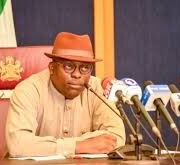The declaration of a state of emergency in Rivers State by President Bola Tinubu has reignited the Ijaw ethnic group’s pursuit of self-determination in the Niger Delta. Prof. Benjamin Okaba, president of the Ijaw National Congress (INC), expressed dissatisfaction with the move, viewing it as another setback for the Ijaw people. He announced that the INC will convene a stakeholders’ meeting to discuss their position and explore options for advancing their self-determination goals within the Nigerian context.
The recent state of emergency declared by President Bola Tinubu in Rivers State is being criticized as hasty. Critics argue that the President had opportunities to address the behavior of Minister Nyesom Wike, who has been described as an antagonist, stating his intent to make governance difficult for Governor Siminalayi Fubara unless certain demands are met—specifically, control over all local government areas and an agreement from Fubara not to contest in 2027. Wike’s desperation for power is perceived as a threat to the people of Rivers State.
The criticism contends that Fubara, who committed to sustainable development for the state, should not compromise his mandate for Wike’s demands. The call is for Wike and all federal appointees from the state to be removed to prevent further crises. There is concern that the declaration of a state of emergency plays into Wike’s strategy to create chaos if other political avenues, like the judiciary or the House of Assembly, fail to remove him from power. Critics argue this undermines democracy in Rivers State.
Retired president of the Delta State Customary Court, Miakpor Emiaso, commented on the state of emergency in Rivers State, acknowledging it as an unfortunate but necessary response to the state’s political turmoil. He noted that the ongoing conflict among political figures was undermining the government and judiciary, making intervention unavoidable.
However, Emiaso expressed concerns about the president’s language during the announcement, suggesting it exhibited political bias, particularly by failing to mention the speaker or external influences, such as Nyesom Wike, who he believes is central to the crisis. He criticized the implication that Wike’s influence would continue unchecked, calling for the president to address Wike’s position to ensure fairness.
Additionally, Emiaso deemed the six-month duration of the state of emergency excessive, especially with a retired military officer appointed as the state’s administrator.
Former president of the Ijaw Youth Council, Dr. Chris Ekyor, expressed his shock over the state of emergency declared in Rivers State, suggesting it makes the president appear subordinate to his minister, Nyesom Wike. Ekyor criticized Wike for allegedly orchestrating the crises in the state while the president remained passive. He raised concerns about the legitimacy of 27 lawmakers who defected, questioning how the courts ruled in their favor despite breaching the law. He emphasized that fair judicial processes could have resolved the current issues much earlier.
Ekyor condemned Wike for disrespecting the Ijaw people over a disagreement regarding political candidates and recounted how Wike’s actions have led to violence against the community. He accused Wike of provoking a state of emergency to distract from these issues.
Ekyor also highlighted perceived inconsistencies in the president’s approach, referencing past crises in Lagos State that did not warrant similar emergency measures. He questioned the basis for the president’s actions, suggesting a lack of clarity regarding the real problems in Rivers State and the effectiveness of security measures already in place.
Former presidential candidate Dr. Gbenga Olawepo-Hashim has urged for a quick and peaceful resolution to the ongoing political crisis in Rivers State, emphasizing that the conflict between suspended Governor Siminalayi Fubara and Minister of the Federal Capital Territory Nelson Wike benefits no one. In a statement from his media office in Abuja, he expressed concern over President Bola Tinubu’s declaration of a state of emergency on March 18, 2025, which resulted in the suspension of Governor Fubara, his Deputy NGOzi Odu, and the entire Rivers State House of Assembly for six months. Vice Admiral Ibokette Ibas (rtd) was appointed as the sole administrator during this period.
Dr. Hashim described the situation as troubling, indicating that past political conflicts in Nigeria were typically based on ideological and national interests rather than personal rivalries. He warned that the current political climate in Rivers State represents a worrying shift that could jeopardize the country’s democratic framework.
He called on President Tinubu to approach the resolution of political conflicts with statesmanship and wisdom, given Nigeria’s complex ethnic and loyalty dynamics. Hashim cautioned that measures like a state of emergency should be implemented carefully to prevent further instability.
Drawing comparisons with past states of emergency, he noted that previous declarations were often in response to widespread violence or security threats, unlike the current issue in Rivers State, which is primarily due to political infighting. He also welcomed the House of Representatives’ decision to oversee the actions of the appointed sole administrator, emphasizing the need for constitutional balance and accountability.
Dr. Gbenga Olawepo-Hashim stated that the House of Representatives’ decision to oversee the actions of the Rivers State administrator reinforces the importance of constitutional order and legislative oversight, emphasizing that the National Assembly must uphold democratic accountability as the elected representatives of the Nigerian people.
The political crisis in Rivers State has elicited significant responses from various stakeholders. The Nigerian Bar Association, led by President Mazi Afam Osigwe, SAN, has expressed serious concerns regarding the constitutionality of the suspension, warning that it sets a perilous precedent for democracy in Nigeria. Similarly, the Peoples Democratic Party Governors’ Forum condemned the suspension of democratic institutions in Rivers State, labeling it an assault on Nigeria’s federal structure and a threat to political stability.
Hashim urged all political figures involved in the conflict to prioritize the well-being of the people over personal interests, cautioning that ongoing instability could adversely affect Nigeria’s unity and democratic future. He concluded with a call for political leaders to move beyond personal disputes and focus on fostering governance that promotes peace, progress, and prosperity for the nation.
